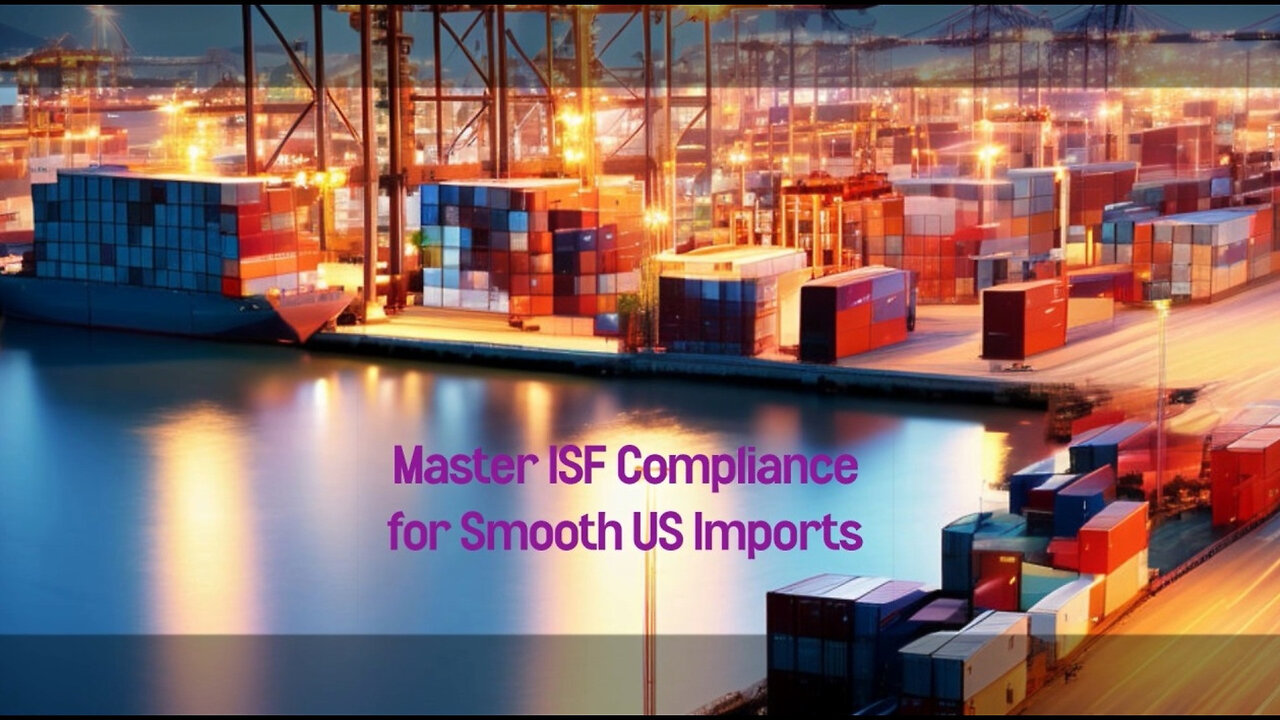Premium Only Content

Unlocking the Secrets of ISF Compliance: Why Importers Shouldn't Ignore It!
License To Import // 323-578-6432 // file@licensetoimport.com // www.licensetoimport.com
Importing goods into the United States involves several regulatory requirements, one of which is the Importer Security Filing (ISF). ISF, also known as 10+2 filing, mandates that importers provide specific information about their cargo prior to its arrival in the country. It is a legal requirement enforced by the US Customs and Border Protection (CBP).
Compliance with ISF regulations is crucial for importers for several reasons. Firstly, non-compliance can result in penalties, delayed shipments, and even the seizure of goods. It is essential for importers to ensure timely and accurate filing to avoid these consequences and maintain a smooth supply chain.
Additionally, ISF compliance plays a significant role in enhancing supply chain security. By sharing detailed information about their shipment in advance, importers assist CBP in identifying potential security risks associated with the cargo. This proactive approach contributes to the overall safety and security of the nation's ports and borders.
Furthermore, ISF compliance helps importers streamline their logistical operations. Timely submission of the ISF filing ensures that CBP has the necessary information to process the cargo efficiently. This minimizes the chances of cargo holds, examinations, and delays at the port of entry, saving both time and money for the importer.
When preparing an ISF filing, importers must include key elements such as buyer and seller details, manufacturer information, country of origin, HTSUS number, container stuffing location, and consolidator details. Accuracy and completeness are vital to avoid penalties and facilitate a seamless customs clearance process.
To navigate the complexities of ISF compliance, importers often choose to work with licensed customs brokers. Customs brokers possess the expertise and knowledge required to comply with customs regulations effectively. They assist importers in gathering the necessary information, preparing the ISF filing, submitting it to CBP, and handling any potential issues that may arise.
In conclusion, ISF compliance is crucial for importers due to its legal requirements, contribution to supply chain security, and minimization of logistical challenges. Importers must strive to submit accurate and timely ISF filings to avoid penalties, ensure a smooth customs clearance process, and contribute to the safety and security of the nation's ports and borders.
#usimportbond #isfcustomsbroker #uscustomsclearing #isfentry
Video Disclaimer Here: This video is solely for education and is not endorsed by any US government agency.
00:21 - Importer Security Filing (ISF), also known as 10+2 filing, is a requirement by U.S. Customs and Border Protection (CBP) for importers to provide specific information about their cargo before it arrives in the United States. This filing must be submitted electronically ideally 24 hours before loading the cargo onto the vessel at the foreign port.
00:50 - ISF compliance is crucial for importers as it is a legal requirement. Failure to comply can result in penalties, delayed shipments, and even seizure of goods. Timely and accurate ISF filings help importers avoid costly consequences and maintain a smooth supply chain process.
01:19 - ISF compliance enhances supply chain security by helping CBP identify potential security risks associated with cargo entering the country. By sharing detailed information in advance, importers contribute to the safety and security of the nation's ports and borders.
02:32 - To ensure successful ISF compliance, importers often work with licensed customs brokers who have the expertise to navigate customs regulations. Customs brokers assist in gathering required information, preparing and submitting the ISF filing, and addressing any potential issues. By submitting accurate and timely ISF filings, importers can avoid penalties, facilitate a smooth customs clearance process, and ensure port and border security.
-
 LIVE
LIVE
Darkhorse Podcast
3 hours agoThe 262nd Evolutionary Lens with Bret Weinstein and Heather Heying
1,954 watching -
 1:29:21
1:29:21
The Quartering
3 hours agoRFJ Confirmation MELTDOWN, BLM Supermayor Brawl, 50 Million On Condoms For Gaza & More Insanity!
47.4K55 -
 1:23:49
1:23:49
The Officer Tatum
2 hours agoLIVE: RFK Jr. GOES OFF In Confirmation Hearing, Karoline Leavitt COOKS PRESS! + MORE | EP 50
25.8K24 -
 LIVE
LIVE
Mally_Mouse
2 hours agoLet's Yap About It - LIVE!
426 watching -
 LIVE
LIVE
ZWOGs
4 hours ago🔴LIVE IN 1440p! - Learning Heroes in Marvel Rivals, Helldivers 2, Then what? - Come Hang Out!
134 watching -
 16:38
16:38
SLS - Street League Skateboarding
7 days agoRayssa Leal's Most Clutch SLS Wins Ever! 🥶🏆
13.7K1 -
 1:53:02
1:53:02
Russell Brand
4 hours agoRFK Confirmation Battle – The Deep State is Losing Control! – SF528
132K145 -
 2:58:09
2:58:09
The Charlie Kirk Show
4 hours agoThe RFK Confirmation Hearing + Dr. Phil On A Raid | Dr. Phil, Mansdoerfer | 1.29.2025
165K39 -
 4:41:31
4:41:31
Right Side Broadcasting Network
1 day agoLIVE REPLAY: RFK Jr. Testifies at Senate Confirmation Hearing for HHS Secretary - 1/29/25
257K296 -
 28:22
28:22
Stephen Gardner
4 hours ago🔥Sen. Lindsay Graham BETRAYS TRUMP, calls for investigation!
36.7K80